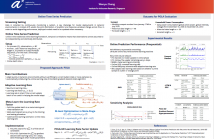
- Read more about SCORE-BASED CHANGE DETECTION FOR GRADIENT-BASED LEARNING MACHINES
- Log in to post comments
- Categories:
 18 Views
18 Views
- Read more about A Unified Approach to Translate Classical Bandit algorithms to Structured Bandits
- Log in to post comments
- Categories:
 7 Views
7 Views
- Read more about SELF-INFERENCE OF OTHERS' POLICIES FOR HOMOGENEOUS AGENTS IN COOPERATIVE MULTI-AGENT REINFORCEMENT LEARNING
- Log in to post comments
- Categories:
 7 Views
7 Views
- Read more about POLA: Online Time Series Prediction by Adaptive Learning Rates
- Log in to post comments
Online prediction for streaming time series data has practical use for many real-world applications where downstream decisions depend on accurate forecasts for the future. Deployment in dynamic environments requires models to adapt quickly to changing data distributions without overfitting. We propose POLA (Predicting Online by Learning rate Adaptation) to automatically regulate the learning rate of recurrent neural network models to adapt to changing time series patterns across time.
POLA_slides.pdf
POLA_poster.pdf
- Categories:
 16 Views
16 Views
- Read more about Optimum Feature Ordering for Dynamic Instance–wise Joint Feature Selection and Classification
- Log in to post comments
poster.pdf
- Categories:
 22 Views
22 Views
- Read more about STEP-GAN: A One-Class Anomaly Detection Model with Applications to Power System Security
- Log in to post comments
Smart grid systems (SGSs), and in particular power systems, play a vital role in today's urban life. The security of these grids is now threatened by adversaries that use false data injection (FDI) to produce a breach of availability, integrity, or confidential principles of the system. We propose a novel structure for the multi-generator generative adversarial network (GAN) to address the challenges of detecting adversarial attacks. We modify the GAN objective function and the training procedure for the malicious anomaly detection task.
- Categories:
 26 Views
26 Views
- Read more about Stabilizing Multi agent Deep Reinforcement Learning by Implicitly Estimating Other Agents’ Behaviors
- Log in to post comments
Deep reinforcement learning (DRL) is able to learn control policies for many complicated tasks, but it’s power has not been unleashed to handle multi-agent circumstances. Independent learning, where each agent treats others as part of the environment and learns its own policy without considering others’ policies is a simple way to apply DRL to multi-agent tasks. However, since agents’ policies change as learning proceeds, from the perspective of each agent, the environment is non-stationary, which makes conventional DRL methods inefficient.
- Categories:
 60 Views
60 Views
- Read more about CONTINUAL LEARNING THROUGH ONE-CLASS CLASSIFICATION USING VAE
- Log in to post comments
Presentation slides of ICASSP 2020 video
- Categories:
 59 Views
59 Views
- Read more about SeCoST: Sequential Co-Supervision For Large Scale Weakly Labeled Audio Event Detection
- Log in to post comments
Weakly supervised learning algorithms are critical for scaling audio event detection to several hundreds of sound categories. Such learning models should not only disambiguate sound events efficiently with minimal class-specific annotation but also be robust to label noise, which is more apparent with weak labels instead of strong annotations. In this work, we propose a new framework for designing learning models with weak supervision by bridging ideas from sequential learning and knowledge distillation.
- Categories:
 8 Views
8 Views
- Read more about Sibling Neural Estimators: Improving Iterative Image Decoding with Gradient Communication
- Log in to post comments
For lossy image compression, we develop a neural-based system which learns a nonlinear estimator for decoding from quantized representations. The system links two recurrent networks that \help" each other reconstruct same target image patches using complementary portions of spatial context that communicate via gradient signals. This dual agent system builds upon prior work that proposed the iterative refinement algorithm for recurrent neural network (RNN)based decoding which improved image reconstruction compared to standard decoding techniques.
- Categories:
 42 Views
42 Views